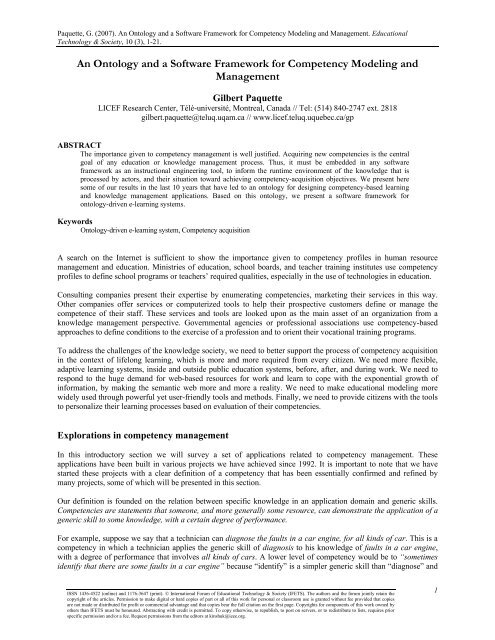July 2007 Volume 10 Number 3 - Educational Technology & Society
July 2007 Volume 10 Number 3 - Educational Technology & Society
July 2007 Volume 10 Number 3 - Educational Technology & Society
Create successful ePaper yourself
Turn your PDF publications into a flip-book with our unique Google optimized e-Paper software.
Paquette, G. (<strong>2007</strong>). An Ontology and a Software Framework for Competency Modeling and Management. <strong>Educational</strong><br />
<strong>Technology</strong> & <strong>Society</strong>, <strong>10</strong> (3), 1-21.<br />
An Ontology and a Software Framework for Competency Modeling and<br />
Management<br />
Gilbert Paquette<br />
LICEF Research Center, Télé-université, Montreal, Canada // Tel: (514) 840-2747 ext. 2818<br />
gilbert.paquette@teluq.uqam.ca // www.licef.teluq.uquebec.ca/gp<br />
ABSTRACT<br />
The importance given to competency management is well justified. Acquiring new competencies is the central<br />
goal of any education or knowledge management process. Thus, it must be embedded in any software<br />
framework as an instructional engineering tool, to inform the runtime environment of the knowledge that is<br />
processed by actors, and their situation toward achieving competency-acquisition objectives. We present here<br />
some of our results in the last <strong>10</strong> years that have led to an ontology for designing competency-based learning<br />
and knowledge management applications. Based on this ontology, we present a software framework for<br />
ontology-driven e-learning systems.<br />
Keywords<br />
Ontology-driven e-learning system, Competency acquisition<br />
A search on the Internet is sufficient to show the importance given to competency profiles in human resource<br />
management and education. Ministries of education, school boards, and teacher training institutes use competency<br />
profiles to define school programs or teachers’ required qualities, especially in the use of technologies in education.<br />
Consulting companies present their expertise by enumerating competencies, marketing their services in this way.<br />
Other companies offer services or computerized tools to help their prospective customers define or manage the<br />
competence of their staff. These services and tools are looked upon as the main asset of an organization from a<br />
knowledge management perspective. Governmental agencies or professional associations use competency-based<br />
approaches to define conditions to the exercise of a profession and to orient their vocational training programs.<br />
To address the challenges of the knowledge society, we need to better support the process of competency acquisition<br />
in the context of lifelong learning, which is more and more required from every citizen. We need more flexible,<br />
adaptive learning systems, inside and outside public education systems, before, after, and during work. We need to<br />
respond to the huge demand for web-based resources for work and learn to cope with the exponential growth of<br />
information, by making the semantic web more and more a reality. We need to make educational modeling more<br />
widely used through powerful yet user-friendly tools and methods. Finally, we need to provide citizens with the tools<br />
to personalize their learning processes based on evaluation of their competencies.<br />
Explorations in competency management<br />
In this introductory section we will survey a set of applications related to competency management. These<br />
applications have been built in various projects we have achieved since 1992. It is important to note that we have<br />
started these projects with a clear definition of a competency that has been essentially confirmed and refined by<br />
many projects, some of which will be presented in this section.<br />
Our definition is founded on the relation between specific knowledge in an application domain and generic skills.<br />
Competencies are statements that someone, and more generally some resource, can demonstrate the application of a<br />
generic skill to some knowledge, with a certain degree of performance.<br />
For example, suppose we say that a technician can diagnose the faults in a car engine, for all kinds of car. This is a<br />
competency in which a technician applies the generic skill of diagnosis to his knowledge of faults in a car engine,<br />
with a degree of performance that involves all kinds of cars. A lower level of competency would be to “sometimes<br />
identify that there are some faults in a car engine” because “identify” is a simpler generic skill than “diagnose” and<br />
ISSN 1436-4522 (online) and 1176-3647 (print). © International Forum of <strong>Educational</strong> <strong>Technology</strong> & <strong>Society</strong> (IFETS). The authors and the forum jointly retain the<br />
copyright of the articles. Permission to make digital or hard copies of part or all of this work for personal or classroom use is granted without fee provided that copies<br />
are not made or distributed for profit or commercial advantage and that copies bear the full citation on the first page. Copyrights for components of this work owned by<br />
others than IFETS must be honoured. Abstracting with credit is permitted. To copy otherwise, to republish, to post on servers, or to redistribute to lists, requires prior<br />
specific permission and/or a fee. Request permissions from the editors at kinshuk@ieee.org.<br />
1

















